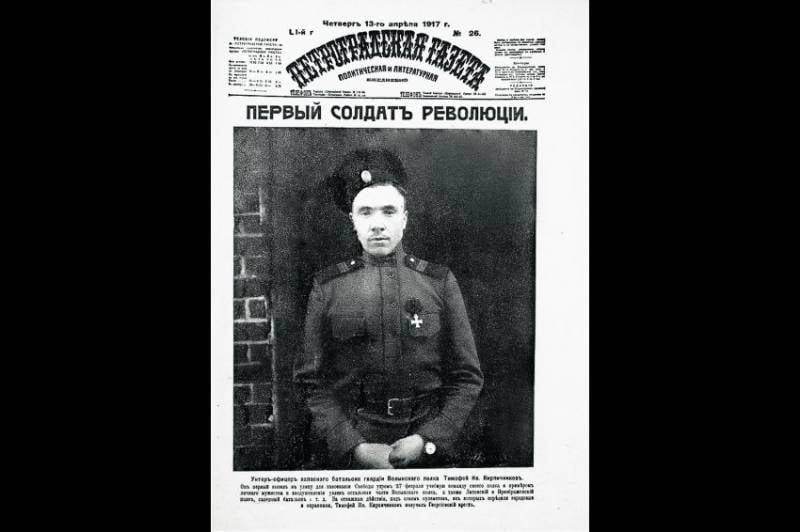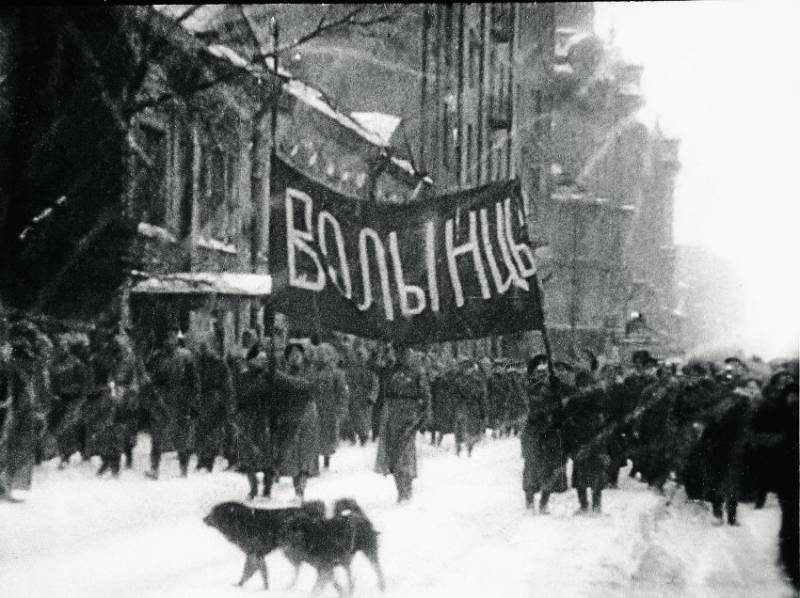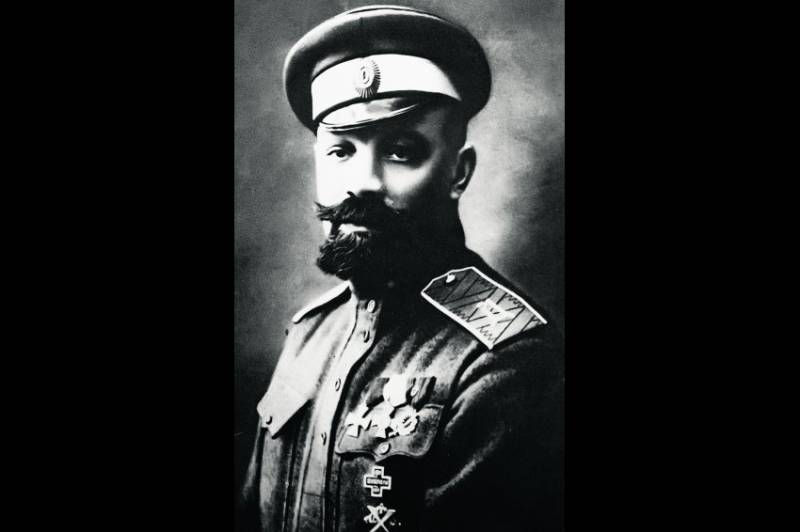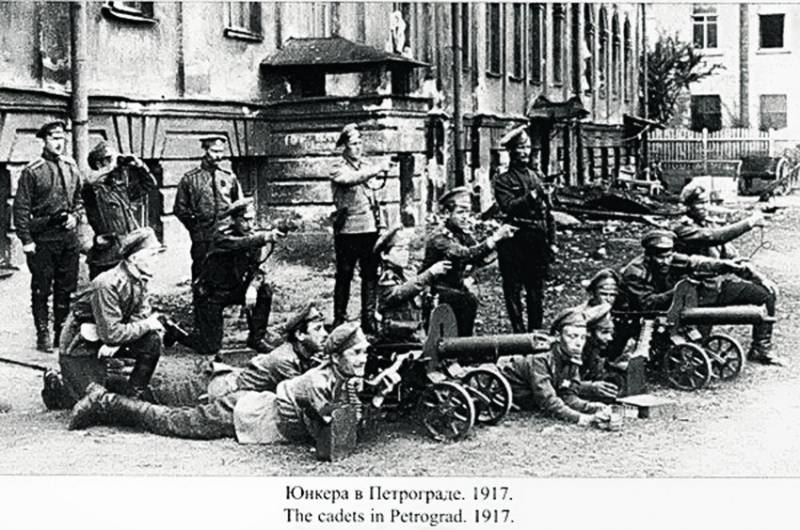Timofey Kirpichnikov's fatal mistake
26 February 1917 of the year. "The revolution has failed!"
In the evening of February 26 1917, Alexander Kerensky mercilessly stated: "The revolution has failed!" But the night that came was resolved by a great surprise. The revolution, about which no one spoke and which no one expected, came true!
How? Why? Where did the people on the street come from and by what magical wave did the Volynsky regiment leave the barracks that played the decisive role?
The regiment brought tsarist non-commissioned officer Timofey Kirpichnikov, whom Kerensky would pathetically call the “soldier of the revolution number one”.
The minion of fortune magically exalted by revolution. And cruelly crushed by it.
The insurgent soldiers of the Volynsky regiment march with banners to the Tauride Palace. 1 February 1917 of the year.
27 February. 6.00. The murder of officer Lashkevich
If you believe the reports of the then newspapers, Kirpichnikov fought on the Austrian front, was wounded in the arm, after the hospital was in spare parts in Petrograd. He served in the second company of the Volyn regiment. Not very friendly with discipline. But, as a sniffing of gunpowder, was popular among the soldiers.
The archives found evidence of Volyn Pazhetnyh about a key episode of the February events:
“February 27 in 6 a team in 350 was already built in the morning. Speaker Kirpichnikov spoke about the general situation and explained how to act and what needs to be done ... At this time, a spur rattling was heard in the corridor. The team was alert for a minute froze. Ensign Kolokolov, a former student who had recently arrived at the regiment, came in. The team responded to his greeting in the usual way. Commander Lashkevich came in. (Gold glasses, unpleasant glasses!) Everything was set on the alert. Silence reigned. The greeting was "great, brothers!" "burst" cheers "- as we had agreed earlier. (According to the charter: “I wish you good health, Your Honor!”) When “hurray” died, Lashkevich seemed to sense something, but the greeting repeated once more. And again, a powerful and terrible “hurray” is heard. Lashkevich refers to To the non-commissioned officer Markov, he angrily asks what it means. Markov, throwing a rifle on his arm (bayonet at the officer!), answers firmly and with a call: “Hurray” is a signal to disobey your orders! "
In the next instant, Kirpichnikov tore a pistol from his holster and fired at an officer.
We can only guess what was going on in the soul of the unter who broke the oath. According to the laws of war, he was subject to execution. Probably that is why his speech addressed to the soldiers was so emotional. Slogans do not have to be invented, they are widely known: beat the officers, save the revolution, king of the bloodsucker, the queen is German!
In the electrified atmosphere, a gust worked. For Kirpichnikov gone.
So Volynsky regiment was on the street.
27 February. Noon. March of the "Army of the Revolution"
Further poorly fit into the picture of the heroic epic, soon penned. As it was established, the Volyn soldiers at first did not even think about the glory of the revolutionary pioneers. The murder of officer Lashkevich occurred two blocks from the parliamentary citadel - the Tauride Palace. And they went to the Duma to surrender and ask for leniency, fearing a tribunal for murder.
But on the way, a soldier’s convoy overgrown with a mob, the first revolutionary fraternization of people with guns and civilians began ...
We must pay tribute to Kerensky, he reacted instantly:
"I saw a soldier surrounded by a crowd of demonstrators lining up on the other side of the street. They were somewhat fussy and hesitantly standing up in ranks, feeling insecure without officers, in an unaccustomed setting. I watched them for a few minutes, and then suddenly, as I was, without a hat, without a coat, in a jacket, ran through the main entrance to the soldiers, whom I waited for so long with hope ... And so we went to the "assault" by the guard. It turned out that there was no security there, I ran away before our appearance. I explained to some noncom to the official where to arrange the guards, and returned to the big hall of the Duma, which has already been hammered by deputies, soldiers, civilians ... I remember when signing some papers, I could not help but laugh.
- Why are you laughing, Alexander Fedorovich? one reporter asked. - Do not you know that at the moment you are all-powerful in Russia?
Well, it was good to hear that. "
"Some non-commissioned officer" - Timofey Kirpichnikov. What do we know about a person who is at the epicenter historical events and who played a major role in them?
He was born in 1892 year. Village Dmitrovka Saransk district Penza province, a simple peasant family, from the Old Believers ... Whether from the traditions of the old faith, inherited the spiritual power and flame of Avvakum, the revolutionary nature of Timothy? One can only guess. Having mastered the beginnings of literacy in the folk school, he worked as a locomotive fireman, having reached military age before the start of the First World War, he ended up in the army in the field ...
By the time the fate of the non-commissioned officer wounded at the front made a puzzling reversal, he was only 25 years old. As much as the staff captain Lashkevich killed by him. Kirpichnikov, of course, does not think about his own near death. So far, he and his Volyn soldiers, who came to the Tauride Palace on the day of February 27 1917, are declared the "Army of the Revolution".
And in an instant, Kerensky transformed, without delay, sends the "army" to the liberation of the socialists sitting on trial and the investigation: the prison on Shpalernaya is just a few minutes walk away ...
28 February. Morning. "Soldier of the Revolution Number One"
The morning after the revolution, Kirpichnikov woke up famous. His portraits hung on fences and exhibited in shop windows. Yesterday the noncom was invited to the members of the soldiers and workers Petrosovet. Alexander Fedorovich Kerensky publicly called him "soldier of the revolution number one" and came up with a revolutionary award for his "protégé" - the Russian Cross of St. George on a red bow. And the "first general of the revolution" Lavr Kornilov, the commander (with 2 of March) the troops of the Petrograd military district, personally handing the cross to Timothy, announced the assignment of an officer's rank to him:
"For the fact that 27 February, becoming the head of the training team of the battalion, first started the struggle for the freedom of the people and the creation of the New Building, and despite the gun and machine-gun fire in the barracks of the 6 barracks of the Reserve Battalion and the Foundry Bridge, he took an example of personal bravery a soldier of his battalion and seized machine guns from the police. "
The police had no machine guns: they did not rely on the state. The revolution composed its first fairy tales. And create characters.
Perhaps the most striking of them in the spring of 1917, was Timofey Kirpichnikov.
He was now seen in many places in Petrograd: he continued to actively raise the soldiers and workers' masses to "fight against the enemies of the revolution", causing the latter to hate them. "... I did not see a more vile man. His small gray eyes running around, the same as Milyukov’s, with an expression of something predatory, his manner to keep himself when, in his passion for his story, he took theatrical poses, his immensely arrogant look and swagger — all this made an extremely disgusting impression, which I cannot convey ... "- the famous memoirist Prince Nikolai Zhevakhov, who served as the comrade (deputy) of the Ober-Prosecutor of the Holy Synod, left us with an impartial portrait of Kirpichnikov .
But in the people Timofey Kirpichnikov remained almost an epic hero. During the "April crisis", when the Bolsheviks headed by Lenin first tried to encroach on the absolute possession of the country, the "first soldier of the revolution" brought the soldiers to the streets again. And he helped the Provisional Government - also temporarily - to paralyze the claimants to power.
Very soon, this will have a fatal effect on Kirpichnikov's fate.
Alexander Pavlovich Kutepov.
General Kutepov's account
He will meet the October coup in the service of the Provisional Government. At the time of General Krasnov’s offensive on Petrograd, Kirpichnikov will try again to organize a soldier’s rebellion — against the Bolsheviks. But this time he will suffer a complete failure: only boys from junker schools were able to raise. Their resistance will be brutally crushed, and Timofey Kirpichnikov runs to the Don ...
The fact that the hero of the bourgeois revolution was a man far from wisdom is proved by the denouement of his short revolutionary career. Kirpichnikov planned to join the ranks of the formed White Army. It probably did not occur to him that the first fighter of the revolution was the first enemy of the counter-revolution ...
Once in the location of parts of General A.P. Kutepova, the arrogant "soldier of the revolution number one" began to insist on a personal meeting with the commander. Kutepov and told, already in exile, about this strange meeting. His words were recorded by General E.I. Dostovalov. Surname Kirpichnikova in the story does not appear, but there is no doubt about whom it is.
“I recall the story of General Kutepov, characteristic of the mood of the insurgent officers, from the early days of the Volunteer Army, which he liked to repeat and which invariably aroused the general sympathy of the listeners.
“Once,” said Kutepov, “a young officer came to my headquarters, and very casually told me that he had come to the Volunteer army to fight the Bolsheviks“ for the freedom of the people ”, which the Bolsheviks trample on. I asked him where he was until now and what he was doing, the officer told me that he was one of the first "fighters for the freedom of the people" and that in Petrograd he took an active part in the revolution, one of the first against the old regime. When the officer wanted to leave, I ordered him to stay and, having called the duty officer, sent for a dress. The young officer became agitated, turned pale, and began to ask why I was delaying him. Now you will see, I said, and when the outfit came, I ordered to immediately shoot this “freedom fighter”.
Kirpichnikova was taken outside the railway embankment. They took and destroyed all the documents and newspaper clippings with which he used to confirm his merits before the revolution. The body was left in a roadside ditch.
How was it known to the “first soldier of the revolution” who brought 27 February 1917 to Volynsky Street, that on the same day and on the same streets, General Kutepov defended the interests of the “obsolete class” with his army. And that March 2 Russian sovereign abdicated, writing in his diary: "Around treason and cowardice, and deceit!"
Of course, the sovereign had in mind such as Kirpichnikov, whose heroic face looked victoriously at General Kutepov from all Petrograd windows ...
Juncker in Petrograd. 1917 year.
POET POINT
On this day
On this day, an alarmed dignitary
The phone often came up
On this day, frightened, uneven
Phone to the dignitary called.
On this day, in his rebellious noise,
There was a lot of anger and longing,
On this day, marched to the Duma
The first rebel regiments.
On this day, armored cars
Crawled through the streets empty
On this day ... some policemen
From the attics stood up for the regime.
On this day, the country broke itself,
Without looking at what's ahead,
On this day, the queen pressed
Hands to a cold chest.
On this day, the embassies encrypted
The first summary is crooked,
On this day, exultantly exulted
Explicit and secret enemies.
On this day ... Enough, for God's sake!
We know, we know, the axle cracked:
On this day in the ousted Petrograd
There was no powerful hero.
This day arose, blood froth
This day began the Russian rut -
That day Lenin sat down somewhere
In your sealed wagon.
Inquires conscience, like a priest,
Denounces the martyr the shadow ...
Really, God, there is no forgiveness
Us for this crazy day ?!
Arseny Nesmelov




Information